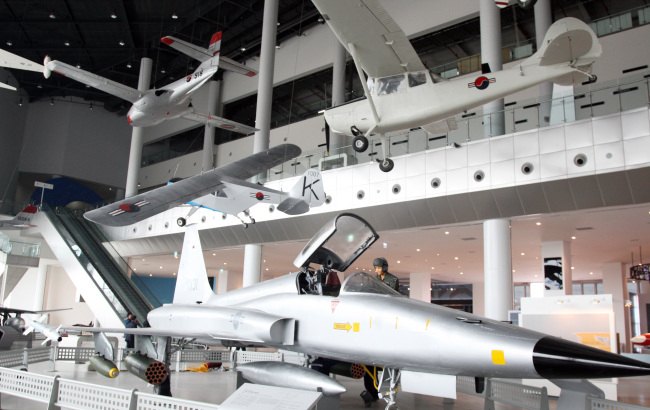Jeju Aerospace Museum, Asia’s largest aerospace museum, opened Thursday in Seogwipo, Jejudo Island, said Jeju Free International Development Center in a press release.
JDC has developed the theme-park type museum in cooperation with the Korean Air Force over the past six years on a 329,838-square-meter plot, at a cost of 115 billion won ($106.7 million).
The museum is composed of two indoor exhibition zones showcasing aviation history and space and astronomy. It also has a theme-based experience zone, an outside exhibition zone, and an observatory, JDC said.
JDC has developed the theme-park type museum in cooperation with the Korean Air Force over the past six years on a 329,838-square-meter plot, at a cost of 115 billion won ($106.7 million).
The museum is composed of two indoor exhibition zones showcasing aviation history and space and astronomy. It also has a theme-based experience zone, an outside exhibition zone, and an observatory, JDC said.

“Under the goal of building a top-notch aerospace museum in Asia, JDC cooperated with globally renowned aerospace museums like the Smithsonian National Air and Space Museum in the U.S. from the initial stage of development,” JDC chairman Kim Han-wook said.
“I believe that the Jeju Aerospace Museum will offer visitors a chance to gain an understanding and interest of the aerospace industry.”
The museum, aimed at positioning itself as an educational theme park, has diverse technology-based educational and experience programs, including flight simulation games and five-dimensional theater shows, to attract younger visitors.
JDC has already developed a variety of camp programs for teenage students in Korea.
“The museum will be the only place for visiting students to learn about the past, present and the future of Korea’s aerospace industry,” a JDC official said.
To attract foreign tourists to the museum, audio tour guides will be provided in four languages: Korean, English, Chinese and Japanese.
JDC has pushed for multiple development projects, including one to build a high-tech business complex called Jeju Science Park, to vitalize the local economy.
Last year, the scenic resort island drew more than 10.8 million tourists, including 2.33 million people from overseas, with the government striving to attract 15 million visitors a year by 2018.
By Seo Jee-yeon (jyseo@heraldcorp.com)










![[Hello India] Hyundai Motor vows to boost 'clean mobility' in India](http://res.heraldm.com/phpwas/restmb_idxmake.php?idx=644&simg=/content/image/2024/04/25/20240425050672_0.jpg&u=)








